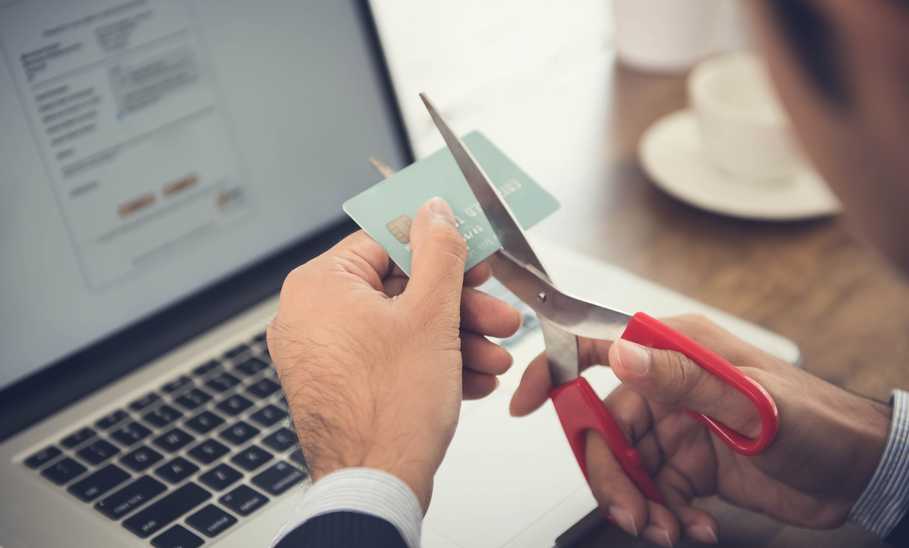Should You Cancel An Unused Credit Card or Keep It?

Our evaluations and opinions are not influenced by our advertising relationships, but we may earn a commission from our partners’ links. This content is created by TIME Stamped, under TIME’s direction and produced in accordance with TIME’s editorial guidelines and overseen by TIME’s editorial staff. Learn more about it.
You’ve got a credit card that you aren’t using, and you’re wondering if you should close the account. In some cases, it could be the best course of action. In others, it could negatively impact your overall financial situation and your credit score.
If you want to know whether or not canceling an unused credit card is a good idea, keep reading. We'll discuss the pros and cons of canceling an unused credit card so you can determine whether or not this is the right choice for you.
Your credit score is made up of five factors:
When you close a credit card account, it can affect your credit utilization, which accounts for 30% of your credit score. For instance, if you’ve got a total of $20,000 in available credit across all your credit accounts with a combined balance of $10,000 across all your credit accounts, your credit utilization ratio is 50% (or $10,000 divided by $20,000).
Let’s say you are closing a credit card with a $5,000 limit. Now, you only have $15,000 in available credit with a $10,000 balance, increasing your credit utilization ratio to 67%.
Using more of your available credit can signal to potential lenders that you’re in a cash crunch and a credit risk. You want to keep your utilization as low as possible to keep your credit score high.
Canceling or closing a credit card account can also average the length of credit history, also known as the average age of accounts. When you close an account, the average age of accounts decreases, potentially harming your score.
If you close an unused credit card and apply for a new one, you are now adding hard credit inquiries to your credit profile. New credit inquiries can also negatively impact your credit score.
If you don’t want to cancel your credit card, you’ve got a few options:
You can simply choose not to use your credit card. Some issuers will close your account due to inactivity, so you should know how long you have before this happens. A quick call or message to your issuer's customer service department can give you this information.
If you’d like to keep the credit card open, but don’t want to be at risk for account closure, use it sparingly. Then pay it off immediately. This way, there’s some activity, but you aren’t bogged down by the responsibility of managing another card.
Managing another credit card payment, even infrequently, could still be too much for some people. Another tactic along these same lines is to use it for one or two recurring fees, like streaming services, then pay it off by autopay each month. You can set your autopay to debit the entire card balance from your checking account, so your payment is never late and you never carry a balance.
Someone relatively new to building credit history, may want to consider keeping their card open. You may not want to chance a dip in your credit score if you’ve got a particular credit goal in mind.
When you are buying a home, loan underwriters will be watching your credit profile like a hawk. Ideally, they don’t want to see any changes. Of course, you should not open any new credit accounts, but you should not close any either. The best thing to do is get clearance from your loan officer before making any moves that could show up on your credit report.
If you find yourself in a situation where you need access to credit, like moving across the country, leaving a job or starting a new business venture, keeping an unused card could be helpful. If you don’t qualify for other types of loans like a line of credit or a personal loan, credit cards can be a bridge while fixing a cash flow issue.
Sometimes, closing a credit card just makes sense. If there’s a high annual fee, membership or other maintenance costs, then you shouldn’t keep it. Someone struggling with managing multiple credit cards and payments may be relieved at the thought of cutting back and simplifying their finances.
And if you are tempted by having too much credit available, it might be best to close your credit card.
If you decide that closing a credit card is the right move, then there are ways you can minimize the impact on your score.
Take the example above. Suppose you got a credit limit increase on another existing card. Now, your new credit limit across accounts is still $20,000, despite closing an unused card with a $5,000 credit limit. In that case, you should see minimal impact on your score because your utilization ratio is essentially the same.
Take caution with this approach because some issuers treat requests for credit limit increases as a new credit application. You may have to agree to a hard credit inquiry to get approval, which, again, could harm your credit score.
If you are really concerned about using a large percentage of your available credit, you can pay your balances down or off. You should consider this if you’ve got a high annual percentage rate (APR) but ultimately have the cash to pay it off. There’s no sense in paying interest if you don’t have to.
Though this may not affect your credit score the same as having your own open trade line, it can still be useful. For this strategy to be effective, the primary cardholder should keep their account in good standing, and the issuer should report this information to the credit bureaus.
Trying to maintain a credit card with a high annual fee can be a great reason to cancel a card. For example, the card_name is a whopping annual_fees per year (Rates & Fees)! The card_name will set you back a hefty annual_fees each year (terms apply).
If you like these issuers but don’t want to pay the fee, you can either request a downgrade or a fee waiver. The first move is also known as a product change. You have to be careful with this because you’ll likely lose some card benefits, and the issuer could even claw back points you’ve earned — though it’s not always the case. Good no-annual-fee cards include the Chase Freedom Flex℠ card.
Another strategy is to ask your issuer to waive the annual fee. Some cardholders report success by asking for the waiver outright or threatening to close their card. Either way, this could work, but it might be a temporary solution, because the fee will be due again next year.
Depending on the circumstances, closing a credit card can affect your finances and credit score. As outlined above, there are ways to side-step the negative effects, but it has to work for your needs. Now that you know the pros and cons and alternatives, you can choose the path that works best for you.
For rates and fees of the card_name, please visit this URL.
You can have as many credit cards as you can manage responsibly. Ideally, you should only maintain the number of credit cards that allow you to pay your balance off each month so as to avoid paying interest.
Secured credit cards, credit builder loans, personal loans, auto loans and mortgages can help you build your credit profile.
A credit score helps lenders determine how likely you are to pay a debt obligation. A lower credit score indicates you are a high-risk borrower, affecting your approval odds for credit products. If you are approved with a low credit score, you may have unfavorable terms on the money you borrow, such as a higher interest rate.
The information presented here is created by TIME Stamped and overseen by TIME editorial staff. To learn more, see our About Us page.



